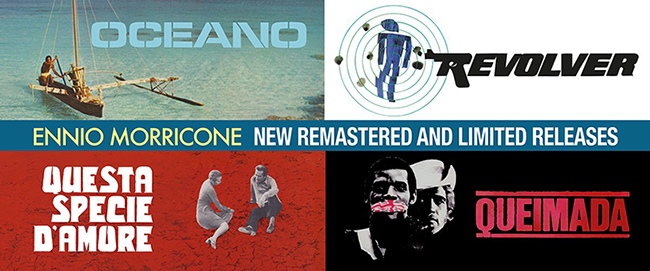
23-Aug-2025 -
Quartet Records, in collaboration with Universal Music Publishing Italia and EMI Music Publishing, presents a remastered reissue of Ennio Morricone’s fascinating score for Folco Quilici’s Oceano (1971), a pseudo-documentary film about a young Polynesian, Tanai, who goes in search of the island of his dreams. On an epic sea voyage from Polynesia to Alaska, aboard a tiny fragile raft, he is guided by the voices of his ancestors.
Morricone’ score for OCEANO seeks to merge nature with mythology. It breathes, vibrates, transmits, and is characterized by its episodic and atmospheric structure, taking the form of an evocative soundscape. The composer draws on resources that recall a primitive, spiritual component: tribal percussion (tablas and bongos), solo woodwinds (flutes and clarinets), guitar, sitar, clanging metal and harp. The fusion of timbres in this instrumentation is unconventional. He expressively sets to music ideas associated with wind or nature, sound textures that construct Tanai’s intimate journey: we hear the sea, we feel the air roaring over the sail of his canoe, the danger lurking in the ocean, his loneliness. The music is another character that gives the film a lyrical dimension and complements the visual element, transcending its narrative function to become a gateway to meditation on the mystery of the sea and existence. Through his unmistakable style, Morricone invites us to immerse ourselves in a world of introspection, beauty and silent emotion.
Quartet Records, in collaboration with EMI General Music Publishing, presents a remastered reissue of Ennio Morricone’s iconic poliziesco score for Sergio Sollima’s Revolver (1973), a violent Italian-French thriller starring Oliver Reed and Fabio Testi. In the film, a prison warden is forced to exchange a French criminal for his kidnapped wife, but they soon find themselves on the trail of a larger conspiracy.
For REVOLVER, Morricone created the original song “Un Amico,” performed by Daniel Beretta, which is possibly one of the most beautiful melodies written by the Roman maestro (it was included by Tarantino in a key sequence of INGLOURIOUS BASTERDS). Morricone also provides a wistful and playful love theme (“Anna”) and several background source cues in his inimitable style.
Another major ingredient of the score is a cue titled “Revolver” or “Inseguimento e Fuga” (Chase and Escape). Morricone composed a 12-minute version of this dynamic piece as well as other varied arrangements to fit different moments in the film. “Revolver” is a driving, staccato piece of music for piano and orchestra that repeats and builds, creating a dark, propulsive atmosphere in the style that became Morricone’s shorthand for crime and gangster action.

Quartet Records, in collaboration with EMI General Music Publishing, presents a remastered reissue of the beautiful, nostalgic Ennio Morricone score for the 1973 romantic drama Questa Specie d’Amore, directed by Alberto Bevilacqua. The film is about Federico (Ugo Tognazzi), who is married to Giovanna (Jean Seberg), a rich and attractive woman who has guaranteed him an excellent social position. His father, Giuseppe, on the other hand, is an anti-fascist and works as a craftsman.
Following in the footsteps of his previous collaboration with Bevilacqua on LA CALIFFA, Morricone wrote a radiantly passionate score for QUESTA SPECIE D’AMORE, featuring one of his most heartfelt and profound love themes and beautiful variations on it. Another nostalgic theme, written for solo oboe, defines Federico’s loneliness and the breakdown of his marriage.
Quartet Records, in collaboration with EMI Music Publishing, presents a remastered reissue of Ennio Morricone’s impressive, epic score for Gillo Pontecorvo’s ambitious, slavery-condemning 1969 production Queimada (aka BURN!), starring Marlon Brando. The film tells the story of a British mercenary who in 1844 helped the slaves of an Antilles island colony revolt and gain independence for the island from Portugal, but later returned to hunt down a local rebel leader and former protégé.
Because they previously worked together with great success on THE BATTLE OF ALGIERS, the next collaboration between Morricone and Pontecorvo was eagerly awaited. The composer rose to the occasion, writing a monumental score, led by the freedom hymn “Aboliçao”, a kind of beat Luba-mass. The music of QUEIMADA is characterized by its rich textures, dramatic contrasts, and a fusion of European, African, and Latin American elements. Morricone avoids falling into decorative folklore, instead creating a deeply emotional score, using both traditional orchestra and choir, organ, tribal percussion, electric guitars and Hammond organ, generating a fascinating hybrid soundscape.
For more info and ordering, visit Quartet Records.
|